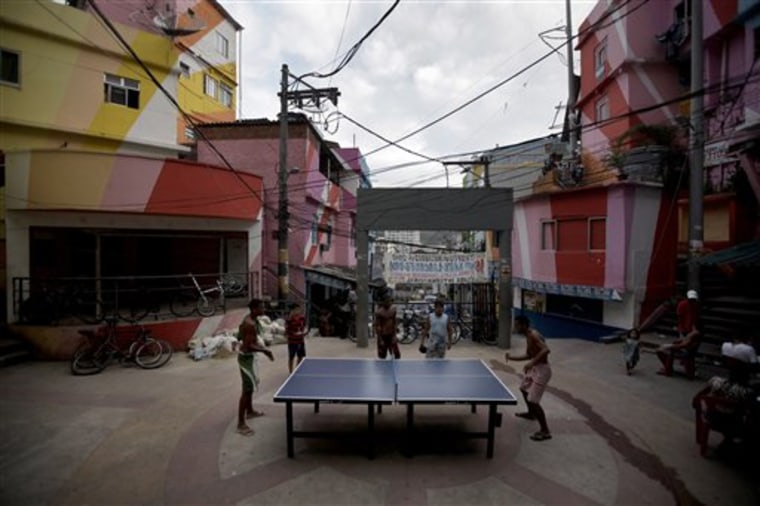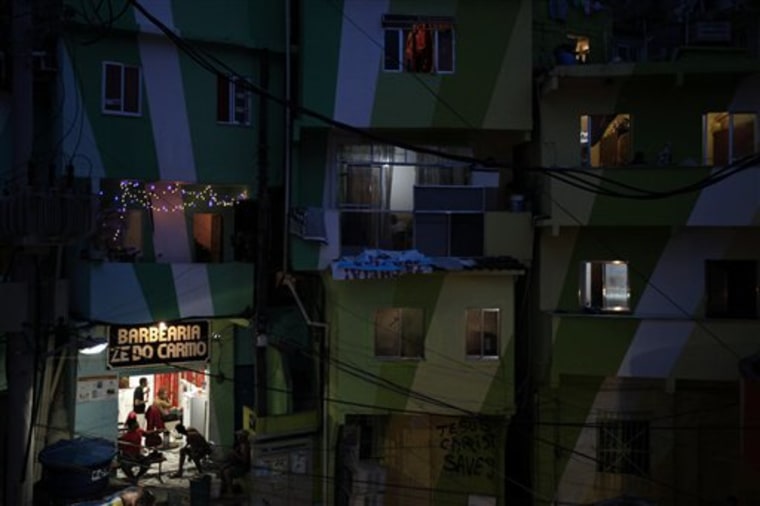At his barbershop carved into the steep flank of a Rio hillside slum, Jose do Carmo dos Santos used to cut the hair of the neighborhood's drug dealers and of the addicts who walked up the narrow alleyways for a fix and stuck around for the $5 trims.
His only request of the drug trade's foot soldiers was that they not flash their assault rifles around the shop and scare away customers. Above all, Ze do Carmo, as he's known in the Santa Marta shantytown, is a businessman.
But then in 2008 police stormed Santa Marta to evict the dealers as the community became the pilot in a program to root out gangs and bring government services to slums long abandoned by the state. The program has since been replicated in a dozen slums, all in a bid to make one of the world's more dangerous cities safer before the 2014 World Cup and the 2016 Olympics. Police took control of three more shantytowns Thursday in what they described as a peaceful operation.
The program has transformed the slums, bringing improved security, utilities and investment, and incorporating local businesses into the formal economy. But the changes also have driven up rents and increased bureaucracy, pushing many of the poorest residents further to the margins.
Moneyed clients
For Ze do Carmo, the new, moneyed clients who are arriving in Santa Marta offer a chance to sell beer at a higher price from his barbershop at night, and to jack up rent in the six houses he owns from $180 to $300.
"Things are very good and improving," said Ze do Carmo. "We're integrating with the city in a way I've never seen. My clientele used to include a lot of addicts. Now I even get tourists who come up here to see the community and take advantage of our prices for a haircut."
Garbage collectors come by more frequently, although they still avoid the sheerest heights, where precariously perched shacks are accessible only after a strenuous hike.
The utility company has started to install power cables to replace the thick, tangled mess of wires that brought pirated electricity to the community in unreliable spurts. Internet and cable companies are offering packages tailored to residents of the favelas, as the slums are known.
The massive "bailes funk" — parties fueled by a bass-heavy beat and, police say, by drugs provided by traffickers — have been banned.
In their place, Santa Marta's main square is hosting more sedate samba shows led by a band from the city's affluent south side, where favela residents, paying $6, mix with middle-class youngsters who pay $18 for the music and the thrill of going into an area they wouldn't have dared enter before.
Antonia Carlos Gomes, who is raising twin 4-year-old girls alone on a hospital janitor's salary, is considering moving to Santa Marta, which is within walking distance of a beach and public transportation.
For $240 a month, she could move from her cramped apartment in a public housing building to a small house on the hillside shantytown and cut her rent in half.
'It's safer'
"It's cleaner here now, and it's safer," she said, sipping a beer after talking to a landlord.
Some, however, are less enamored with the changes.
A survey by the state government showed real estate prices in some slums skyrocketed up to 400 percent after police took control and outsiders started eyeing the still-affordable living space.
For lifelong resident Leidemar Barreto, who ekes out a living reselling clothes from her home to raise six children, government attention has meant higher rent and bills she can't afford.
The moisture trickling down the granite hillside on which the slum is built permeates the hot, windowless room she rents and rots the wooden walls. The beams supporting the floor buckle in places, leaving her sick with worry for her 6-year-old, who barrels in and out of the house heedless of the danger.
Sewage runs in open troughs, and the smell hangs thick in the air — a reminder of how much the community still lacks. For this home, she pays $180 — half her monthly earnings and double the original rent.
"All these changes, the cable car to the top, safer streets, are good, but it's been nothing but struggle for me," she said. "I want to leave, but where can I go from here?"
Integrating into the favela's new economy and the city's job market also is much harder for young people without much formal education. Some made good money supporting the drug traffic. Others simply had no chance to go to school in an area long abandoned by the state and now are being forced to compete.
Peace in the slums can only be sustainable if these young people have access to training and jobs, said Wilson Risolia, head of the state's education department.
'Debt' to young people
"The state has a debt toward these young people," said Risolia, attending the first graduation of an adult education program giving junior high and high school diplomas to 59 students from Santa Marta.
Still, the change in the slums since the programs were launched is visible.
When police first entered Vila Cruzeiro, a slum taken over in November, pigs would root through trash piled as high as the shacks of exposed brick and wood. Sullen young men would sit at rickety tables sipping beer and watching the entrances to the favelas, leaving most residents too intimidated to talk openly with visitors.
In Santa Marta, two years of police presence have eased the tension. Conversation and beer flows easily as locals elbow outsiders in packed bars. On a hot summer day, women sitting on their stoops chat with passers-by, with children running up and down the long stairways leading into the slum.
Residents lead visitors around the once off-limits Santa Marta as they earn certification through a state program to be official city guides. Since August, when the program was launched, about 200 people a day visit the slum.

More than 1,000 businesspeople have registered with the government in four shantytowns over the last two years.
Pointing to a small convenience store in the slum's main square, Andreia Roberto, head of the Santa Marta business association, discussed the practice of trading an existence at the margins of legality.
Registering as a business, she said, would give the store's owner access to bank credit, to a wholesaler where he could get products for less, and to a complaint line when the beverage company refuses to deliver crates of beer to the store.
"When you're informal, you have no rights. Formalized, you can do anything, you can complain," she said.
Andreia Roberto's own husband, Paulo, is unconvinced.
Since going completely by the books, he said, he's seen a lot of bureaucracy and bills, without enough new customers to make up for it. He's turned off one of the two refrigerators running in his makeshift bar now that he has to pay for the electricity, and misses the "bailes funk" that used to send him thirsty customers.
"Yes, some things are better, and you can call to complain when the electricity is down and all your food is going bad, but they charge you for that — and they don't always deliver," he said.
